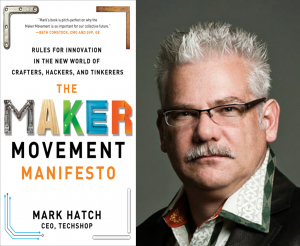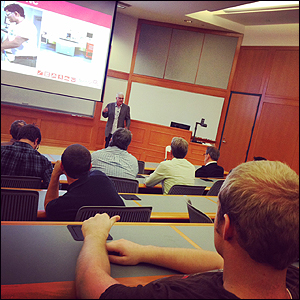Boom! might be the sound of an explosion of successful businesses created by an entirely new generation of inventors with only a few hundred dollars in their pockets who build prototypes at professional makerspaces and raise funds through crowdsourcing.
These ‘makers’ are part of a movement that is a catalyst to democratize entrepreneurship. Giving people low-cost access to high tech tools, knowledge and the community needed to create things has destroyed the barriers to innovation, says Mark Hatch, who has been at the front lines of the Maker Movement.
“This is the beginning of a third industrial revolution and it will be as large if not larger than the first (late 18th century in Britain) and the second (early 20th century in America) because it’s still very young,” said Hatch. “Make magazine published in 2005. The first Maker Faire was in 2006.”
Hatch delivered the Vanderbilt School of Engineering’s Chambers Family Entrepreneurial Lecture Oct. 7: BOOM! The Maker Revolution: How the Maker Movement is changing the world and why you should join the movement (video).
 “Every revolution needs a manifesto,” said Hatch, drawing laughs from the audience. Hatch is the author of the 2013 book Maker Movement Manifesto, and CEO and co-founder of TechShop, a fast-growing chain of eight U.S. co-working spaces of 15,000 to 20,000 square feet, with more than $1 million in advanced tools and cutting-edge software that can be used after completion of safety and basic use classes.
“Every revolution needs a manifesto,” said Hatch, drawing laughs from the audience. Hatch is the author of the 2013 book Maker Movement Manifesto, and CEO and co-founder of TechShop, a fast-growing chain of eight U.S. co-working spaces of 15,000 to 20,000 square feet, with more than $1 million in advanced tools and cutting-edge software that can be used after completion of safety and basic use classes.
“This is a participatory revolution.” And, it was a participatory lecture, with Hatch cueing the crowd of about 100 people to yell ‘Boom’ after he fired off a stunning fact or an inspiring anecdote of TechShop successes.
At no other time in history has it been easier for an idea to originate in the imagination of a single individual and spread to a mass market. Advances in 3D printing and low-cost microcontrollers as well as the ubiquity of advanced sensors are enabling makers to bridge software with the physical world.
Game changers are tool cost and CNC machining. “A good lathe years ago cost $150,000. You can get lathes for five grand now,” Hatch said. CNC (computer numerical control) machining means tools like lathes, mills, routers, and grinders are controlled by computers. 1 2 3 Make modeling software is free.
“Machining is easy now. With CNC, you just hover over a big red button in case something goes wrong,” Hatch said. “We call the laser cutter our gateway drug. Almost everyone starts on a laser cutter and they get hooked. We call the waterjet cutter the sexy beast. It can cut anything up to 5 inches thick,” Hatch said.
At TechShop locations, a member pays $150 a month for access to tools and machines, sophisticated 2D and 3D design software, expert advice on projects or techniques from Dream Coaches, and access to hundreds of classes.
A community building business
“TechShop is not an education platform. We’re a community building business. The San Francisco location has more than 1,000 members. The other locations average about 500 members. When you energize 500 to 1,000 people to make things, you create an amazing community.”

Four new locations are under construction: St. Louis will join the eight U.S. locations. A TechShop will open soon in Paris, Tokyo and Abu Dhabi, taking the Menlo Park, Calif.-based company global. Ten locations are in development.
Hatch said it takes about $3.5 million to launch a shop, and a $10 million commitment over five years. That requires a different type of community. “Going out and evangelizing doesn’t work,” Hatch said.
“It takes a coalition – one to three companies, a university, some venture capital. Autodesk and National Instruments are big supporters. Ford funded the Detroit facility. Fujitsu is a supporter in Tokyo. Washington University is a partner in St. Louis. The Veterans Administration and DARPA (Defense Advanced Research Projects Agency) are partners in D.C. and Pittsburgh.”
“There are lots of business accelerators and incubators out there. There are only five hardware accelerators in the U.S. We want to see 1,000 makerspaces in the U.S.,” Hatch said.
Entrepreneurs and economic impact
What the shops really produce are entrepreneurs and economic impact.
“This is the impact from the Bay Area’s three locations: $12 billion in shareholder value, 2,000 jobs, $200 million in annual salaries,” Hatch said.
He shared 16 TechShop success stories. Some members have product ideas, some become “accidental entrepreneurs” and others experiment with a new career.
James McKelvey, the creator of Square Reader – the small device that plugs into a cell phone or tablet headset jack and allows uses to accept credit card payments – got his start at TechShop. “Probably TechShop’s most impactful startup is Square,” Hatch said.
Tina Albin-Lax is an accidental entrepreneur. “Tina came to TechShop to learn how to use a laser cutter. After she completed the class she went back the next day to practice. Her nephew’s birthday party was that evening and so she decided to make custom cupcake toppers with each kid’s name. She walked away with $400 in orders and a business she didn’t even know she had.” Her Etsy business – Better Off Wed – has been featured in Martha Stewart Weddings.
“Perrin Lam lost his job as an ad copywriter and became a jeweler. Perrin is an example of a member who wanted to experiment with a new career,” Hatch said. Lam began making pieces by hand and now he uses machines to make artisanal acrylic jewelry. Lam is the founder of Novodeco.
“Patrick Buckley took a textile class and learned to use the CNC machine that cuts wood. His bamboo DODOcase for the iPad had $1 million in sales in just 90 days, and it turned into a $3 million in revenue startup in just nine months. President Obama uses a DODO for his iPad.”
“We had an early hypothesis that some people will change the world,” Hatch said.
“Embrace began as a class project by a group of graduate students at Stanford. They were trying to design a blanket that would rapidly stabilize the body temperature of hypothermic infants in developing countries. They took their ideas to TechShop, gained access to the tools and technology they needed and developed a prototype.” Today the award-winning Embrace Warmer blanket has saved more than 150,000 babies, Hatch said.
Nick Koshnick, who earned a Ph.D. in applied physics in 2009 from Stanford, made use of TechShop for his Silicon Valley startup Solum. Using Solum’s testing, software and hardware system, farmers can test soil in the field to pinpoint its chemical makeup and capacity to hold water. The data goes into a digital file, which farmers plug into their spraying machines fine-tuning exactly how much water and fertilizer spray, down to the square yard.
“Solum saves water and reduces damage caused by fertilizer runoff. This has the potential for huge environmental impact,” Hatch said. “Recently, two of five top ag startups have come out of Menlo Park.”
After the lecture, Hatch signed copy of his book for a fan: “Let’s change the world.”
Contact:
Brenda Ellis, (615) 343-6314
Brenda.Ellis@Vanderbilt.edu
Twitter @VUEngineering